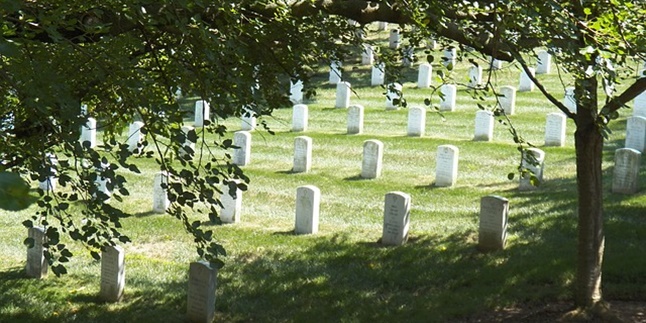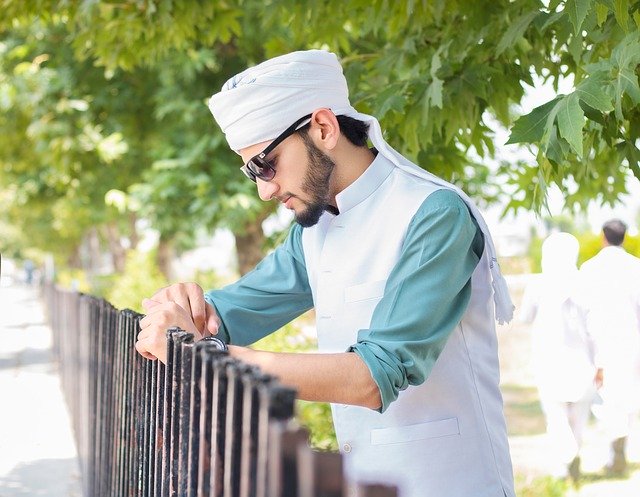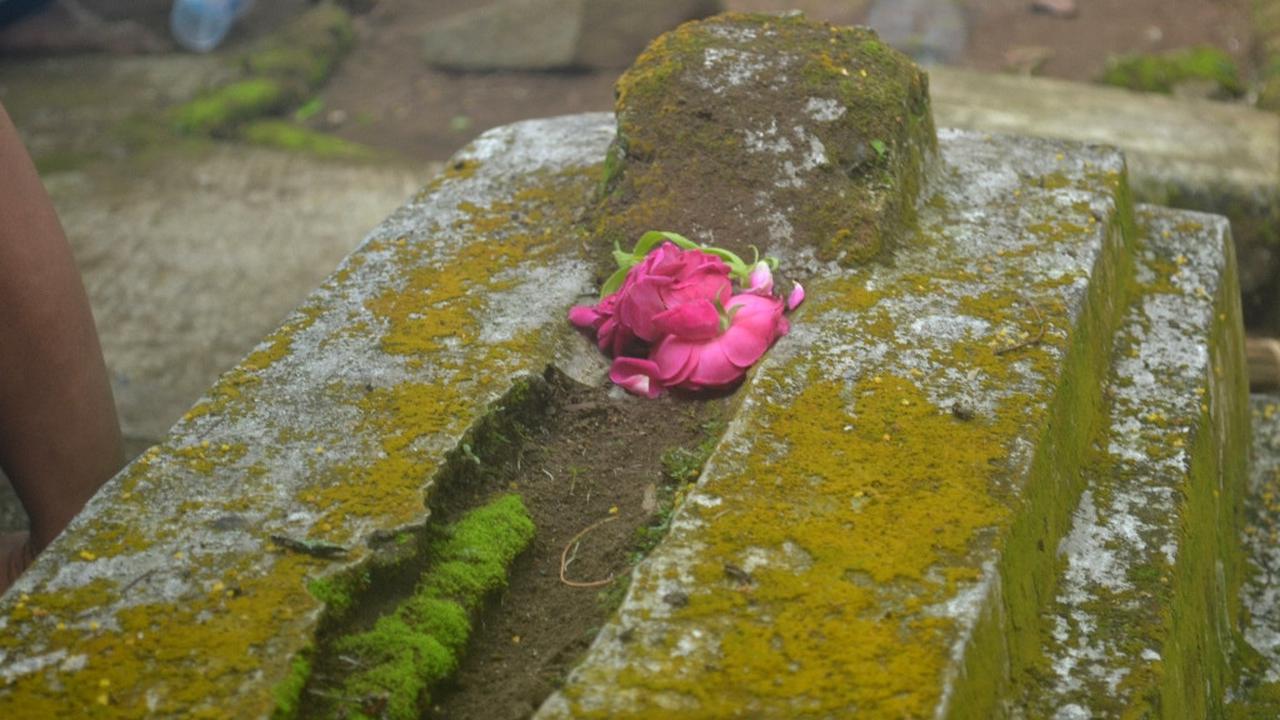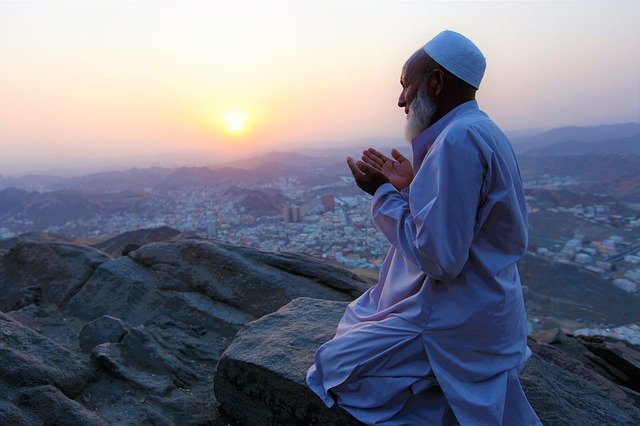7 Natural Ways to Thicken Eyebrows, Only Using Lemon - Candlenut Oil
Having thick eyebrows is every woman's dream. By using some natural ingredients, you can naturally get thicker eyebrows. Let's take a look.

Kapanlagi.com - Visiting graves or visiting the graves of family and ancestors has become a tradition for the Indonesian people. This tradition is usually carried out during various special moments, one of which is before the month of Ramadan. For some families, visiting graves has become a habit. So it's no wonder that every family may have their own procedures for visiting each grave.
No one knows exactly when visiting graves became a tradition before Ramadan. However, what is clear is that every time entering the month of Ramadan, cemeteries will be filled with families who visit the graves of their family or ancestors.
ALSO READ: Doa Tahlil Arabic Latin with Meaning
In Islam, visiting graves is believed to make humans remember death more, so it is hoped that a person's faith will increase after returning from the visit. But what about the procedures for visiting graves in Islam?
Because, as we know, Islam regulates everything related to the lives of its followers, including visiting graves. Here are the procedures for visiting graves and prayers that can be recited during the visit, summarized from various sources.

(credit: pixabay)
In a hadith narrated by Ibn Majah, the Prophet Muhammad initially prohibited visiting graves, but then corrected himself and actually encouraged it. Because it can remind people of the hereafter. Here is the wording of the hadith.
(Before) I forbade you from visiting graves, so (now) visit graves, indeed visiting graves makes you detached from the world and reminds you of the hereafter (HR. Ibn Majah).
In another hadith, the Prophet Muhammad mentioned that prayers recited for the deceased during a visit will reach the souls being prayed for. Here is the wording of the hadith.
It is narrated from Prophet Muhammad that he said, 'There is no comparison to a deceased person in his grave except like a drowning person who wants to be saved. The deceased is waiting for prayers directed towards him, whether from his children, siblings, or friends. When that prayer is directed towards him, he loves that prayer more than the world and everything in it' (Sheikh Nawawi Al-Bantani, Nihayat al-Zain, p. 281).
Based on this hadith, visiting graves is an activity that is permissible for every Muslim, as long as it is done with good intentions, such as remembering death and praying for deceased family members or relatives who passed away earlier.

(credit: illustration of a grave via liputan6)
Every Muslim knows that Islam regulates the etiquette of its followers. Even the etiquette of Muslims must be maintained when they are at the cemetery. Here are examples of actions that maintain etiquette at the cemetery:
1) Do not sit on top of the grave
2) Do not step on the grave
3) Do not do excessive things, such as lamenting the grave, crying, kissing the tombstone, and so on.
Visiting graves cannot be done carelessly and arbitrarily. That is why, Islam regulates the procedures for visiting graves.
1) Perform Wudu (ablution)
Before going to the cemetery to visit graves, Muslims are advised to purify themselves by performing ablution first.
2) Saying Salam (greeting)
Just like when visiting someone's house, when visiting graves, Muslims are advised to say salam (greeting). As we know, salam in Islam also means a prayer for others. Therefore, by saying salam when entering the cemetery, it means that we are also praying for the buried bodies in that cemetery.
The salam and prayer that can be said when entering the cemetery are as follows:
Assalamu 'alaikum ahlad-diyaar minal mu'miniina wal muslimiin.Yarhamulloohul mustaqdimiina minnaa wal musta'khiriin.Wa inna insyaa alloohu bikum la-laahiquun.Wa as alullooha lanaa walakumul 'aafiyah.
Meaning: May peace be upon you, O inhabitants of the graves, from the believers and Muslims, may Allah have mercy on those who have preceded us and those who come after us. We will follow you, God willing, I ask for safety for us and you.
3) Position Yourself Facing the Qibla
As we know in Islam, Muslim bodies are buried facing the qibla. Similarly, when we visit graves, it is highly recommended to face the qibla, so in Indonesia, pilgrims are on the left side of the grave.
4) Praying for the Soul of the Deceased
Praying for the soul of the deceased is the core element in the procedure of visiting graves. Prayers are offered for the deceased whose graves are visited.

(credit: pixabay)
As mentioned earlier, the main activity in the procedure of visiting graves is praying for the deceased. However, it turns out that in addition to special prayers for visiting graves, there are several things that should also be read during the visit. Here are the procedures and the order of reciting prayers that can be read during the visit.
1) Reciting tasbih
2) Reciting takbir
3) Reciting tahmid
4) Reciting zikir
5) Reciting Surah Al-Fatihah
6) Reciting the prayer for visiting graves:
A'udhu billahi minashaitanir rajim. Bismillahirrahmanirrahim. Alhamdulillahi robbil 'alamin, hamdan syakirin, hamdan ni'min, hamdan yuwafi ni'amahu wa yukaafi mazidah, ya robbana lakal hamdu kama yanbaghi lijalali wajhika wa 'adzimi sultanik, allahumma sholli wasalim 'ala sayyidina Muhammad wa 'ala ali sayyidina Muhammad.
Allahumma taqabbal wa usil sawaaba maa qoro, nahu minal Qur'anil 'adzim, wa maa halalna wa maa sabahna wamastaghfarnaa wamaa sholaina 'atsayyidina Muhammad sollallohu 'alaihi wasallam, hadiyatan wasilatan, warohmatan najilatan wa barokatan samilatan ila hadoroti habibina wasafi'ina waquroti a'ayunina sayyidina wamaulana Muhammadin sollallohu 'alaihi wa sallam, wa ila jami'i ikhwanihi minal anbiyaai walmursaliina wal auliyaai, wassuhadai, wassolihina, wassohabati wattabi'ina wal'ulamail 'alimina wal mushonnafiinal mukhlisiina wa jami'il mujahidina fi sabilillahi robbil 'alamin, wal malaikatil muqorrobina khususan ila sayyidina syaih Abdul Qodir Zailani.
Summa ila jami'i ahlil qubur, minal muslimina wal muslimati, wal mu'minina wal mu'minati, min masaarikil ardhi ila magooribiha barriha wabahriha khususan ila aabaaina wa ummahaatiina, wa ajdaadina, wanakhussu khususan manijtam'ana huna bisababihi waliajlihi.
Allahumma ghfirlahu warhamhu wa'afihi wa'fu anhu wa akrim nujulahu wawasil madholahu, waghsilhu bilmai wassalji wal barodi wanaqihi minal khotooya, kama yunaqqo saubul abyadu minaddannasi wa abdilhu, darron khoiron min daarihi wa ahlan khoiron min ahlihi wa jaujan khoiron min jauzihi wa adhilhul jannata wa 'aidhu min 'adzabil qobri wa fitnatihi wa min 'adzabin nar, allahumaghfir lihayyina wa mayyitina wa sahhidiina wa ghoniina washogiirona wa kaabirona wadakirona wa ansana, allahumma man ahyaitahu minna fa ahyihi 'alal islami wa man tawafaitahu minna fatawafahu 'alal iiman allahumma la tuhrimna azrohu wa la tudillana ba'dahu birohmatikaya arhamar rohimin, wal hamdu lillahi robbil 'alamin.
Meaning:
I seek refuge in Allah from the accursed Satan. In the name of Allah, the Most Gracious, the Most Merciful. All praise is due to Allah, the Lord of all worlds, the Most Grateful, the Most Beneficent, the One who fulfills His favors and increases them. O our Lord, all praise is due to You, as befits the glory of Your face and the greatness of Your sovereignty. O Allah, send blessings and peace upon our master Muhammad and upon the family of our master Muhammad.
O Allah, accept and reward us for what we recite, which is from the noble Qur'an, and for what we have made lawful and what we have eaten and what we have asked for the sake of our master Muhammad, a gift and a means, a mercy and a blessing that reaches our beloved and our intercessor, and to the eyes of our master and our lord Muhammad, and to all of his brothers from the prophets and messengers, the saints, the martyrs, the righteous, the companions, the scholars, the knowledgeable, the sincere, and all the mujahideen in the way of Allah, the Lord of all worlds, and to the near angels, especially to our master Sheikh Abdul Qadir Zailani.
Then to all the people of the graves, from the male and female Muslims, the male and female believers, from the east to the west of the earth, especially to our fathers and mothers, our grandparents, and we specify especially those who have gathered here for their reasons and rewards.
O Allah, forgive him, have mercy on him, heal him, pardon him, honor his rank, expand his grave, wash him with water, snow, and hail, and purify him from sins, as white clothes are purified from dirt, and replace him with a better home, a better family, a better spouse, and admit him to Paradise and protect him from the punishment of the grave and its trials, and from the punishment of the Fire. O Allah, forgive our living and our dead, our witnesses and our absentees, our young and our old, our men and our women, and whoever among us You have granted life, grant him life in Islam, and whoever among us You have taken in death, let him die in faith. O Allah, do not deprive us of his reward, and do not misguide us after him by Your mercy, O Most Merciful of the merciful, and all praise is due to Allah, the Lord of all worlds.
With worthy praise and His blessings and enabling increase. O our Lord, praise is only for You, as befits the glory of Your Essence and the magnificence of Your Power. O Allah, bestow peace and salvation upon our beloved Prophet Muhammad and his family.
O Allah, accept and convey the rewards of the Quran that we recite, our tahlil, our tasbih, our istighfar, and our salawat to Prophet Muhammad SAW as a gift that connects, as a descending mercy, and as a spreading blessing to our beloved, our helper, and our beloved ones, the leader and the guide, Prophet Muhammad SAW, as well as to all his companions from among the Prophets and Messengers, the saints, the martyrs, the righteous, the companions, the successors, the scholars who practice their knowledge, the sincere authors, and those who strive in the path of Allah, the Lord of all worlds, and to the angels who always worship, especially directed to Sheikh Abdul Qadir Jilani.
Then to all the inhabitants of the graves from among the Muslim men and women, the believing men and women, from the east and the west, at sea and on land, especially to our fathers and mothers, our grandfathers and grandmothers, and especially to the person who caused us to gather here.
O Allah, forgive, have mercy, release, and free him. And honor his place of residence, widen it. And honor his place of residence, widen his entrance, cleanse him with clear and cool water, and purify him from all sins like a clean white garment from dirt, and replace his home with a better home than the one he left, and a better family than the one he left, and a better spouse than the one he left. Enter him into paradise, and protect him from the torment of the grave and its trials, and from the torment of the Hellfire. O Allah, grant forgiveness to us who are still alive and to us who have passed away, to those who are present, to those who are absent, to the young and the old, to males and females. O Allah, whoever among us You give life to, give them life in a state of faith. O Allah, do not prevent us from the rewards of our good deeds for them, and do not lead us astray after their departure by Your mercy, O Lord, Most Merciful. All praise be to Allah, the Lord of all the worlds.
7) Recite Surah Yasin or Short Surahs from the Quran
There is a hadith that discusses reciting Surah Yasin when visiting graves. The hadith is as follows:
Whoever visits the graves of their parents every Friday and recites Surah Yasin beside them, they will be forgiven for the number of verses and letters they recite (Narrated by Ibn 'Adi from Abu Bakr).
Actually, the authenticity of this hadith has not been proven. However, scholars mention that there is no harm in reciting Surah Yasin or other Quranic recitations at the cemetery.
Meanwhile, the recommendation to recite short surahs when visiting graves is mentioned in the following hadith:
When you enter the cemetery, recite al-Fatihah, Surah Ikhlash, and al-Muawwidzatain (al-Falaq and an-Naas). Dedicate the rewards to the deceased in those graves, for surely the rewards will reach them (Narrated by al-Marwazi from Ahmad bin Hanbal).
That is the procedure and important things that Muslims need to know about visiting graves. Hopefully, it can facilitate the tradition of visiting graves before Ramadan this year.
(kpl/psp/gen)
Cobain For You Page (FYP) Yang kamu suka ada di sini,
lihat isinya
Having thick eyebrows is every woman's dream. By using some natural ingredients, you can naturally get thicker eyebrows. Let's take a look.
During fasting, there are certainly prohibitions that should not be done. Of course, this is avoided to maximize fasting worship so that it is not canceled. However, do you know? It turns out there are several things that are allowed to be done while fasting?
Ciplukan fruit has many health benefits. What are the benefits of ciplukan fruit? Find the answers in this article.
Having bad breath can make us lose confidence, but there are several easy and natural ways to overcome it. Curious? Let's check it out.
Sleep disorders at night may be felt by some people and can be very disturbing. However, there are ways to overcome insomnia at night, easily and without consuming drugs.
Sahur food is important as an energy reserve during fasting. However, you need to know 7 types of food that should be avoided during Sahur. What are they? Find out in this article.
Maintaining the growth and development of children during social distancing is very important. But what are they? Let's check it out
In the month of Ramadan, many people compete to find good deeds in the way of Allah SWT. One of them is through prayers and remembrance. Considering the great benefits of prayers and remembrance during Ramadan, here is a collection of prayers and remembrance as good deeds during Ramadan:
The rejection of funeral actions has been widely discussed and reported. This action has also become rampant in several regions. Then, the question is, can Covid-19 infected corpses spread? Let's check out the following review:
Many are curious about Shireen's tips for wearing a square hijab, which is simple and covers the chest. To satisfy her fans' curiosity, Shireen Sungkar shares how to wear a square hijab through her personal YouTube account.
Many people question whether it is true that children are not susceptible to contracting the corona covid-19 virus. For a clearer explanation, let's check the answer right away.
Ramadan is synonymous with dates. It's no wonder that dates are very easy to find in shopping centers. In addition, dates have a variety of benefits that would be a shame to miss.